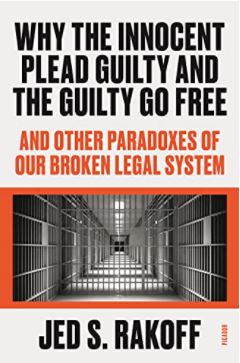
Several years ago, Judge Jed Rakoff began writing articles for the New York Review of Books. The revised essays are the basis for his recent book, Why the Innocent Plead Guilty and the Guilty Go Free, where he concisely shares his views on problems with the current legal system.
It seems counter intuitive for someone who knows he is innocent to agree to a plea, but Judge Rakoff lays out a pretty clear and compelling reason why this happens so often. It starts off with good intentions. Judge Rakoff explains that our desire to crack down on crime and be consistent with sentencing led to the creation of the Sentencing Guidelines, which mandate a specific amount of jail time for a conviction. However, that change inadvertently led to prosecutors gaining quite a bit of leverage for plea negotiations. It is common for an unrepresented defendant to feel that the best option is to plead guilty to a lesser crime and receive only a short prison sentence so as to avoid being convicted of a more serious crime, which carries a much longer prison sentence.
Good intentions seem to play a part in explaining how those responsible for some of the more egregious crimes, such as the people who worked for the banks and perpetuated mortgage fraud in the early 2000s, never got near a courtroom, much less a prison cell. The DOJ, tasked with investigating and prosecuting this large-scale fraud, decided that it would be too difficult to prove that the high-level executives intended to commit these criminal acts. Moreover, the DOJ also believed that even if they were successful at prosecuting these large banking institutions, the disruption to the business would have a detrimental effect on the economy, an effect worse than the crimes allegedly done.
The result was that the very largest institutions, banks and corporations, were fined and tasked with self-policing to prevent future criminal acts (rehabilitation as it were), all with the hope that the criminal activity would stop. The hope was that a better, more ethical culture within the corporation could grow and replace one that was corrupt. Meanwhile, the individuals responsible for the fraud were never punished.
Other chapters in the books discuss the procedures and processes we have implemented to be better: to rely on scientific methods, even if they might be faulty; to find ways to be more efficient; to focus on catching and prosecuting terrorists. The unexpected result is that we have slowly eroded away the protections for defendants so carefully laid out in the Constitution.
The last chapter of the book, ominously titled, “You won’t get your day in court,” outlines the many ways low and middle-income people are frozen out of a fair judicial resolution of their case. The biggest cause is the expense of a hiring a lawyer. The average person can’t pay for an attorney. Many attorneys won’t take cases on contingency because the payout would be too low to be worthwhile. Other examples include forced arbitration clauses, or settlement agreements. The result is that for citizens, “the courts are not an institution to which they can turn for justice, but simply a remote and expensive luxury reserved for the rich and powerful.”
The judge’s frustration is clearly displayed throughout the book, and he concludes that change should come from the legislature. He speculated that might be difficult to do, since most legislators are reluctant to make changes that are seen as “soft on crime.” Nevertheless, he remains hopeful. Recently, Congress was pressed by voters to pass the First Step Act, which lowered mandatory minimum sentences on some drug crimes. He remains cautiously optimistic that American voters will once again rise to the challenge and make other fixes to our legal system.
Jed S. Rakoff, Why the Innocent Plead Guilty and the Guilty Go Free and Other Paradoxes of Our Broken Legal System. New York: Farrar, Strauss and Giroux, 2021.